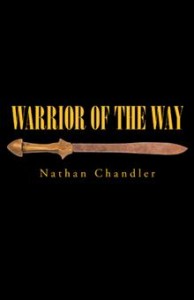 Title: Warrior of the Way
Title: Warrior of the WayAuthor: Nathan Chandler
Publisher: iUniverse
Pages: 376
Genre: Fantasy
Format: Ebook
Purchase at AMAZON
Civil war is a curse that touches everyone, including King Tashdar of the Mulamar. When he is ordered by a powerful and mysterious stranger to send warriors toward Kanai and Kadisha to slaughter everyone, Tashdar has no choice but to obey. As the Hebari emperor’s palace is invaded, only one man escapes—a captain of the guard to whom the emperor has entrusted the safety of his remaining two children. Moments later, the emperor’s legacy is erased from the face of the earth. More than forty years later, Pasha Nuvahli of the Sashramans tribe, greatest of the king’s warriors, is devastated when his wife is murdered and his son is kidnapped. Overcome with despair as war and a dangerous sorcerer threaten the southern tribes, Pasha soon finds himself in a crisis of faith as he ponders why Daiyu has allowed such sorrow to befall him. But after he learns of an ancient prophecy and his hidden connection to the last emperor of the south, Pasha is sent by King Juktan to seek an alliance with the five other Hebari tribes and lead them against an ancient enemy from the north. Suddenly, his life takes on a new meaning. In this compelling story, a worried king looks to his greatest warrior to unify the south with the hope the young soldier can save his people before all is lost forever.

Female Protagonists
and Diversity in Fantasy
Nathan Chandler
I have always found stories told from the female perspective
to be intriguing, thoughtful and full of nuance that you don't always get from
stories with male protagonists. In my book “Warrior of the Way” my main
protagonist is male but I tried to build thoughtfulness and nuance around the
character Pasha Nuvahli like you might see in a female driven narrative. Pasha
is also influenced by many strong female characters who give him perspective
and a new direction to follow when he's feeling lost.
Stories
told through the lens of female protagonists also give readers like me a window
into female lives and issues they face which we might be exposed to otherwise.
But then some might ask; should writers write female driven narratives for the
sole purpose of convincing men of a woman's worth or should writers write
stories that are simply good and then expect a diverse audience to follow? I don't think of it as an either or choice.
In reality it should be a mixture of both. Writers should write more stories
with female protagonists and focus on writing a good story that can also inform
those who read it. I strongly believe in writing stories that leave a lesson or
moral if you will for the reader.
I try to do
that with Pasha Nuvahli in “Warrior of the Way”; many of the things he goes
through are lessons that he internalizes and which the reader might also get
something out of. Trials of faith, skepticism and depression are all issues
that Pasha deals with but by and by he gets through them. I think reading
through Pasha's ordeals might help some readers internalize some message that
might help them get through whatever they might have going on.
As for
diversity in fantasy. I think there needs to be more. Some writers are afraid
of writing about people of other races and backgrounds because they're afraid
of getting it wrong or being accused of getting it wrong. Others don't even
think that fantasy can be a diverse genre. These oversights and misplaced fears
hold back the power of the fantasy genre in many ways and prevent it from
becoming a genre well read by many diverse audiences and not just those who are
young and Anglo. Many African, Asian, and Latino groups have fantasy cultures
and stories that could be incorporated well into narrative fiction. Fantasy
writers can increase their readership substantially by writing stories that are
more diverse and I hope they start doing so more often. There are a lot of
minority readers and some of them like the fantasy genre. I don't think
reaching that market segment is as hard as some in the industry seem to think.
People want
stories with characters who are lively and different in worlds they haven't
seen before. The old European state fantasy model is a good one, and I enjoy
stories like that but there needs to be more available than just that kind of
fantasy story. There is a genuine hunger for more fantasy stories reflecting
more diverse people and I encourage writers out there to meet that need.





0 comments:
Post a Comment